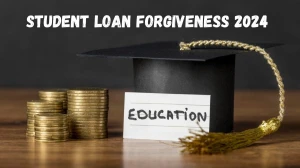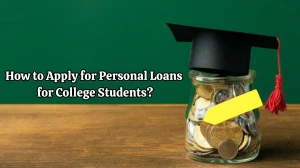
How to Consolidate Student Loans? What is Student Loan Consolidation?
To consolidate student loans, check eligibility, submit the application on the official student aid website, and choose a repayment plan for simplified repayment.
by Sai V
Published Jul 28, 2023 | Updated Dec 01, 2023 | 📖 10 min read
On This Page
- How to Consolidate Student Loans?
- What is Student Loan Consolidation?
- How Does Student Loan Consolidation Work?
- What Are the Pros and Cons of Student Loan Consolidation?
- Comparison Between Federal Loans and Private Loans
- Does Student Loan Consolidation Hurt Your Credit?
- Should I Consider Consolidating My Student Loans?
How to Consolidate Student Loans?
Consolidating student loans is a process that allows borrowers to combine multiple student loans into a single loan, resulting in a more manageable monthly payment and potentially extending the repayment term. It's important to note that student loan consolidation is primarily available for federal student loans. Private student loans can be consolidated through private lenders, which is more commonly referred to as student loan refinancing. Here's a step-by-step guide on how to consolidate federal student loans:
Check Your Eligibility
Before you begin the consolidation process, ensure that you meet the eligibility criteria for federal loan consolidation. Generally, you must have federal student loans that are in repayment or in their grace period. You cannot consolidate loans that are in default unless you agree to enroll in an income-driven repayment plan or make three consecutive, on-time payments on the defaulted loan.
Gather Loan Information
Collect information about your existing federal student loans, including loan types, servicers, and loan amounts. This information will be needed during the consolidation process.
Choose a Repayment Plan
Federal loan consolidation allows you to choose from various repayment plans, including Standard, Income-Driven, Graduated, and Extended plans. Select the repayment plan that best fits your financial situation and goals. Keep in mind that your choice of repayment plan will impact your monthly payments.
Visit the Official Student Aid Website
To initiate the process of consolidating your federal student loans, you'll need to access the official Federal Student Aid website, which is administered by the U.S. Department of Education. This website serves as the central hub for managing federal student loans.
Log In or Create an Account
If you have an existing account on the studentaid.gov website, you should log in using your credentials. However, if you don't have an account yet, you'll need to create one. This account is essential for securely managing your student loan information and applications.
Start the Consolidation Application
Once you are logged in to your account, navigate to the "Consolidate Your Loans" option. This is where you will initiate the consolidation application process. Be sure to select the appropriate option to begin.
Complete the Application
Follow the prompts and instructions provided in the consolidation application. This step involves supplying essential information about your loans, including details about the types of loans you want to consolidate and the specific repayment plan you wish to select. You will be asked to specify which loans you want to consolidate from your existing loans.
Review and Submit
After entering all the necessary information, it is crucial to carefully review the application to ensure that all the details you have provided are accurate and complete. Take your time to verify the data before proceeding. Once you are satisfied that everything is correct, you can proceed to submit the consolidation application.
Sign the Master Promissory Note (MPN)
Upon submitting your application, you'll typically need to sign a Master Promissory Note (MPN). This note serves as a formal agreement, confirming your commitment to repaying the consolidated loan. Your signature signifies your acknowledgment of the terms and conditions associated with the consolidation.
Await Confirmation
After you have submitted your consolidation application and signed the MPN, the consolidation process will enter the review and processing phase. This may take some time, and it's normal to have to wait for confirmation. During this period, you can expect the U.S. Department of Education to assess your application and finalize the consolidation.
Start Repayment
Repayment of your consolidated federal student loans typically begins within approximately 60 days of the consolidation loan being disbursed. It's important to note that you should continue making payments on your existing individual loans until you receive information about the new consolidated loan. This ensures that you stay current on your payments during the transition.
By following these steps, you can successfully consolidate your federal student loans, simplifying your repayment process and potentially extending your loan term to make your monthly payments more manageable. Additionally, consolidating federal loans allows you to retain access to various federal benefits and repayment options.
What is Student Loan Consolidation?
Student loan consolidation is a financial strategy in the United States that allows individuals to combine multiple federal education loans into a single new loan, known as a Direct Consolidation Loan. This process simplifies loan management by creating one monthly payment instead of multiple ones. One of the primary benefits of student loan consolidation is the potential to lower monthly payments, making it easier for borrowers to manage their finances.
It also offers access to various repayment plans, including income-driven options, which calculate monthly payments based on the borrower's income and family size. Additionally, consolidation can grant access to federal loan forgiveness programs and typically provides a fixed interest rate, offering predictability in loan repayment. It can also extend the overall repayment period, potentially resulting in more interest paid over time, and may lead to the loss of certain borrower benefits, such as interest rate discounts.
How Does Student Loan Consolidation Work?
Student loan consolidation is a financial strategy aimed at simplifying your student loan repayment process and, in some cases, reducing your monthly payments. There are two primary methods of consolidating student loans: through a private lender or the federal government. Here's how each method works:
Private Student Loan Consolidation
Selection of a Private Lender
In this approach, you choose a private lender, typically a bank or financial institution, that offers student loan consolidation services.
Loan Repayment
The selected private lender pays off your existing private or federal student loans on your behalf. They then create a new loan with a new interest rate and repayment schedule tailored to your financial situation.
Interest Rate Reduction
Refinancing is most beneficial if you have high-interest private loans. By securing a lower interest rate or better terms with the new loan, you can potentially reduce your monthly payments and save money over the life of the loan.
Loss of Federal Benefits
It's important to note that if you consolidate federal loans into a private loan, you will lose certain federal loan benefits. These benefits may include income-driven repayment plans, loan forgiveness programs, and flexible deferment or forbearance options.
Federal Student Loan Consolidation
Eligibility
Federal consolidation is available only for federal student loans, not private ones.
Federal Direct Loan Program
Through the Federal Direct Loan Program, you can combine multiple federal student loans into a new Direct Consolidation Loan.
Interest Rate Calculation
When consolidating federal loans, your new interest rate is determined by taking the weighted average of the interest rates on your previous loans. This means that your interest rate won't necessarily decrease, but it simplifies repayment by combining multiple loans into one.
Preservation of Federal Benefits
Importantly, federal loan consolidation allows you to retain some of the special features of federal loans. You can still access income-driven repayment plans, Public Service Loan Forgiveness (PSLF), and various deferment or forbearance options.
At MarketsHost, we unravel the complexities of Loans, equipping you with the knowledge and tools needed to navigate the financial world with confidence.
What Are the Pros and Cons of Student Loan Consolidation?
Student Loan consolidation presents a dual-edged financial strategy. Enjoying benefits such as lower monthly payments, simplified management, and flexible terms, borrowers must, however, weigh these advantages against potential pitfalls like long-term costs and the relinquishment of federal loan perks.
Pros of Student Loan Consolidation
Lower Monthly Payments
- Private Loan Consolidation: Private loan consolidation can provide borrowers with lower interest rates, resulting in reduced monthly payments. Lower monthly payments can make managing your budget easier and free up more of your income.
- Federal Loan Consolidation: Federal loan consolidation may qualify you for income-based repayment plans, which can set your monthly payments based on your income and family size. This can be especially helpful for borrowers with variable income or financial difficulties.
Fewer Monthly Payments
- Consolidating multiple loans into a single loan means you only have one (or two, if you consolidate private and federal loans separately) monthly payment to track, simplifying your financial management.
Flexible Repayment Terms
- Private loan consolidation allows you to choose the loan term (length) and whether you prefer a fixed or variable interest rate. This flexibility enables you to tailor your loan to your financial goals and risk tolerance.
Release a Cosigner
- If you refinance your private loans, you may have the option to remove a cosigner from your loan. This can benefit both you and your cosigner by reducing their financial responsibility and potentially improving their credit.
Cons of Student Loan Consolidation
Long-Term Cost
- Extending the repayment term to lower monthly payments can result in paying more interest over the life of the loan. Borrowers with longer loan terms may end up paying tens of thousands of dollars extra in interest.
Loss of Federal Loan Benefits
- If you consolidate a federal student loan with a private lender, you forfeit certain federal loan benefits, including income-driven repayment plans, loan forgiveness, and cancellation programs. It's crucial to weigh these potential losses against the benefits of lower interest rates.
Loss of Grace Periods
- When you refinance with a private lender, you typically lose any grace periods that were available with your original federal loans. This means you may need to start repaying the loan immediately, even if you're still in school or within the grace period of your existing loan.
Comparison Between Federal Loans and Private Loans
Federal Loans and Private Loans present divergent financial landscapes, each with distinct characteristics. Delve into their differences, from sources and interest rates to credit requirements and repayment plans, to navigate the complexities of borrowing wisely.
|
Aspect |
Private Loans |
Federal Loans |
|---|---|---|
|
Source |
Offered by private financial institutions |
Administered by the U.S. Department of Education |
|
Interest Rates |
Usually higher, based on creditworthiness |
Generally lower, set by the government |
|
Credit Check |
Typically required |
Not required for most federal loans |
|
Cosigner |
Often required, especially with limited credit |
Not required, primarily based on financial need |
|
Repayment Plans |
May offer fewer options |
Various flexible plans, including income-driven |
|
Deferment/Forbearance |
Limited or no options during financial hardship |
Extensive options during economic hardships |
|
Loan Forgiveness |
No loan forgiveness programs |
Some programs offer loan forgiveness after the criteria |
|
Benefits |
Competitive rates for excellent credit |
Borrower protections and options for loan discharge |
Does Student Loan Consolidation Hurt Your Credit?
Consolidating federal student loans typically does not negatively impact your credit score, as it does not involve a credit check. When you opt for federal loan consolidation through a government program, your creditworthiness is not a factor in the process. Consequently, there is no immediate effect on your credit score. On the contrary, if you choose to consolidate your loans through a private lender, you may experience a temporary decrease in your credit score.
This decrease occurs because private lenders typically perform a hard credit inquiry during their evaluation. A hard credit inquiry can cause a minor reduction in your credit score. Private consolidation loans often come with lower interest rates and more favorable terms, which can result in reduced monthly payments. Over time, consistently making on-time payments on your consolidated loan can positively influence your credit score.
Should I Consider Consolidating My Student Loans?
Consolidating student loans streamlines payments and may lower overall interest, but extending the repayment period could increase the total cost over time—weigh the benefits carefully against potential drawbacks.
- Consolidating your student loans can be a prudent decision, particularly if you possess loans from various providers.
- The act of consolidation simplifies your financial situation by amalgamating multiple loans into a single one, leading to a more manageable monthly payment.
- Additionally, it might even lead to a reduction in the overall interest payments.
- Another potential advantage of consolidation is the option to extend the repayment period, thus reducing your monthly installment amounts.
- It's important to note, however, that this may result in a higher total interest cost over the life of the loan.
How to Consolidate Student Loans - FAQs
1. How to Consolidate Student Loans?
To consolidate student loans, you have two primary options based on the types of loans you hold. If you have federal student loans, consider consolidating them through the Federal Direct Loan Program offered by the government.
2. What is student loan consolidation?
Student loan consolidation is the process of merging multiple student loans into a single new loan, typically to achieve cost savings or reduced monthly payments.
3. Can private student loans be consolidated?
Yes, private student loans can be consolidated or refinanced, potentially leading to money savings if a lower interest rate can be secured.
4. What are the eligibility criteria for federal student loan consolidation?
There is no credit requirement for federal student loan consolidation, but borrowers must have completed their studies, left school, or dropped below half-time enrollment.
5. What are the types of federal student loans?
The primary types of federal student loans are Direct Subsidized Loan, Direct Unsubsidized Loan, Direct PLUS Loan, and Direct Consolidation Loan.




